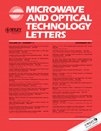Tunable RF-band optoelectronic oscillator and optoelectronic computer-added design model for its simulation
Abstract
A cost-effective tunable version of optoelectronic oscillator (OEO) that overcomes the well-known design tradeoffs in a traditional radio frequency (RF) oscillator is proposed. To validate the technique, a simple computerized model of the proposed OEO is used on the basis of commercial optoelectronic computer-added design tool. The model correctly simulates the phase noise close to the carrier. As an example, we demonstrate a 3-GHz OEO with simulation results that are experimentally confirmed by prototype measurements. A parametric comparison with an advanced wideband synthesizer integrated circuits (IC) is also presented. © 2011 Wiley Periodicals, Inc. Microwave Opt Technol Lett 53:2474-2477, 2011; View this article online at wileyonlinelibrary.com. DOI 10.1002/mop.26304




